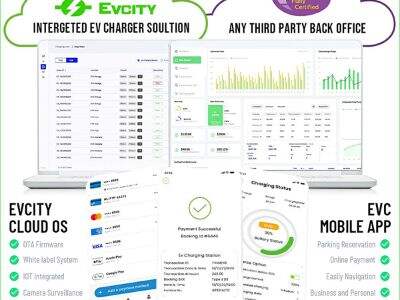전기차(EV)의 증가는 우리 지구에게 매우 긍정적인 영향을 미칩니다. 전기차는 가솔린을 사용하지 않으므로, 일반 자동차에서 배출되는 유해한 가스를 줄이는 데 도움을 줍니다. 우리는 전기차를 운전함으로써 대기 오염을 줄이고 환경을 개선할 수 있습니다. 하지만 전기차를 계속 운행하려면 정기적으로 충전해야 합니다. DC 급속 충전기는 현재 이용 가능한 가장 빠른 충전 방식 중 하나로 효과적입니다. 다양한 종류의 dc 급전전기 제품이 시장에 존재하며, 이로 인해 자신의 요구에 가장 적합한 것을 선택하기가 어렵게 될 수 있습니다. 이 가이드에서는 당신에게 가장 적합한 DC 급속 충전기를 선택하는 방법에 대해 논의할 것입니다. 또한 EV 배터리를 충전하기 위해 알아야 할 정보와 차를 연결할 수 있는 장소들에 대해 배울 수 있습니다.
소유한 전기차와 그 충전 요건에 대해 알아보기
DC 급속 충전기를 선택하기 전에 EV의 적절한 충전 정보를 알아야 합니다. 모든 전기 자동차는 배터리로 작동하며, 귀하의 차량에 어떤 배터리가 장착되어 있는지 및 그 크기를 아는 것은 매우 중요합니다. 이를 알면 귀하는 자신의 EV를 충전할 수 있는 충전기를 선택하는 데 도움이 될 것입니다. 모든 차량에는 표준 충전 포트가 있어 다양한 충전소에 연결할 수 있습니다. 그러나 재충전 속도는 귀하가 운전하는 EV의 종류에 따라 다릅니다. 일부 EV에는 고속 충전 기능이 내장되어 있지만 다른 차량에는 그렇지 않을 수 있습니다. 두 개의 전기 자동차가 반드시 동일하지 않으므로, 귀하의 EV가 무엇을 필요로 하고 어떤 기능을 갖추고 있는지 익히면 보다 현명한 충전기 선택을 할 수 있게 됩니다.
전압, 전류 및 호환성
다양한 유형과 브랜드의 ev dc 급속 충전기 . 다양한 모델마다 사양이 다릅니다 (전압, 전류 등 포함). 전압은 전력의 크기를 나타내는 것이며, 전류는 얼마나 많은 전기가 흐르고 있는지를 알려줍니다. 그러나 빠른 충전기를 선택하기 전에 귀하의 특정 전기차가 어느 정도의 전압과 전류를 필요로 하는지 알아야 합니다. 잘못된 전압이나 전류를 선택하면 차량의 충전 시스템과 배터리가 손상될 수 있습니다. 호환성도 중요한 요소입니다; 모든 DC 빠른 충전기가 모든 전기차 모델과 작동하는 것은 아닙니다. 따라서 안전하고 효과적인 충전을 위해 귀하의 특정 EV 모델과 호환되는 빠른 충전기를 선택하는 것이 중요합니다.
결론: 집, 직장 또는 공공 충전소에서 충전하기
DC 급속 충전기의 가장 일반적인 설치 위치는 가정, 직장 또는 공공 장소입니다. 집에 급속 충전기를 설치하면 매우 편리합니다. 이는 당신이 원할 때 언제든지 차를 충전할 수 있게 해주며, 차량을 항상 운행 준비가 된 상태로 유지할 수 있도록 도와줍니다. 가능하다면 - 차고가 있다면 - 이는 전기차를 충전하는 데 있어 더 저렴한 방법이 될 수 있습니다. 직장용 충전기는 전기차를 소유한 직원들을 대상으로 설계되었습니다. 이러한 충전기는 근무 중인 직원들이 하루 종일 일한 후 집으로 돌아가기 전에 차량을 몇 분 안에 충전할 수 있도록 해줍니다. 공공 충전기는 장거리 여행이나 이동 시 중요하며, 길 위에서 급하게 전력을 보충해야 할 경우 응급 충전소로도 사용될 수 있습니다. 자신의 충전 습관과 일상적인 루틴에 따라 급속 충전기를 어디에 설치할지 고려해보세요.
KWh 및 피크 출력 파워에 대한 이해
DC 급속 충전기는 에너지 사용량에 따라 청구되는 측정 단위인 킬로와트시(kWh)를 가지고 있습니다. 모든 좋은 내부용 충전기가 동일한 양의 kWh를 사용하지 않으므로, 충전기에 사용되는 에너지 양을 아는 것은 전기차를 충전하는 데 드는 비용을 추정하는 데 도움이 됩니다. 충전기의 실제 암페어(MPO: 최대 출력 전력): 최대 출력 전력은 특정 시간에 충전기가 충전할 수 있는 최대 전력량을 의미합니다. 이는 특히 차량을 빠르게 충전할 수 있는 충전기를 고려할 때 중요합니다. 그러나 더 높은 출력 전력을 가진 충전기는 더 많은 전류가 필요하며, 이를 면밀히 모니터링하지 않으면 부적절한 충전으로 인해 차량 배터리 시스템에 손상이 발생할 수 있습니다. 안전한 충전을 위해 충전기를 선택할 때 항상 이러한 요소들을 고려해야 합니다.
접근성과 CB 충전의 미래
선택할 때 dc 급속 충전기 kw , 충전 네트워크에 접근할 방법을 미리 생각해보는 것이 중요합니다. 전기차 기술은 매우 빠르게 발전하고 있으므로, 새로운 전기차 모델들은 다른 종류의 충전기를 필요로 할 수 있습니다. 그리고 충전기를 구매할 때는 나중에 다른 종류의 충전기가 필요할 수도 있다는 점을 염두에 두세요. 특히 장거리 여행 시 충전 네트워크에 접근할 수 있는지가 매우 중요합니다. 올바른 충전 네트워크에 가입하세요. 선택한 충전소가 당신의 차가 속한 충전 네트워크에 속하는지 확인하면 여행 중 경로 상에서 충전기를 찾는 것이 더 쉬워질 것입니다.
LFF Technology — 완벽한 EV DC 급속 충전 솔루션입니다. 이들은 가정용, 직장용 또는 공공 충전기에서 사용할 수 있습니다. 전기 자동차를 구입하는 것은 특히 충전 문제를 고려할 때 걱정이 될 수 있습니다. 충전기의 충전 능력(예: 전압 및 최대 출력)도 당신의 결정 과정에 영향을 미칠 것입니다. 적절한 충전 위치와 차량의 잠재적 업그레이드를 선택하면 가장 적합한 전기 자동차를 선택하는 데 도움이 될 것입니다.
요약하자면, 최고의 DC 급속 충전기를 선택하는 것은 전기차의 성능과 효율성을 극대화하기 위해 매우 중요합니다. 품질 있는 충전기는 차량 배터리의 크기와 유형에 맞게 호환되어야 합니다. 차량에 대한 충전 요구 사항을 이해하고 전압 및 전류 측면에서 적합한 충전 위치를 활용하면 가장 빠르고 편리한 충전 솔루션을 보장받을 수 있습니다. 마지막으로, 충전 네트워크를 미래에도 대비할 의향이 있다면 구식 충전 시스템에 돈을 쓰는 것을 피할 수 있습니다. LFF Technology은 여러 종류의 DC 급속 충전기를 제공하여 EV 소유자가 더 오래, 더 빠르게 주행할 수 있도록 지원합니다.


